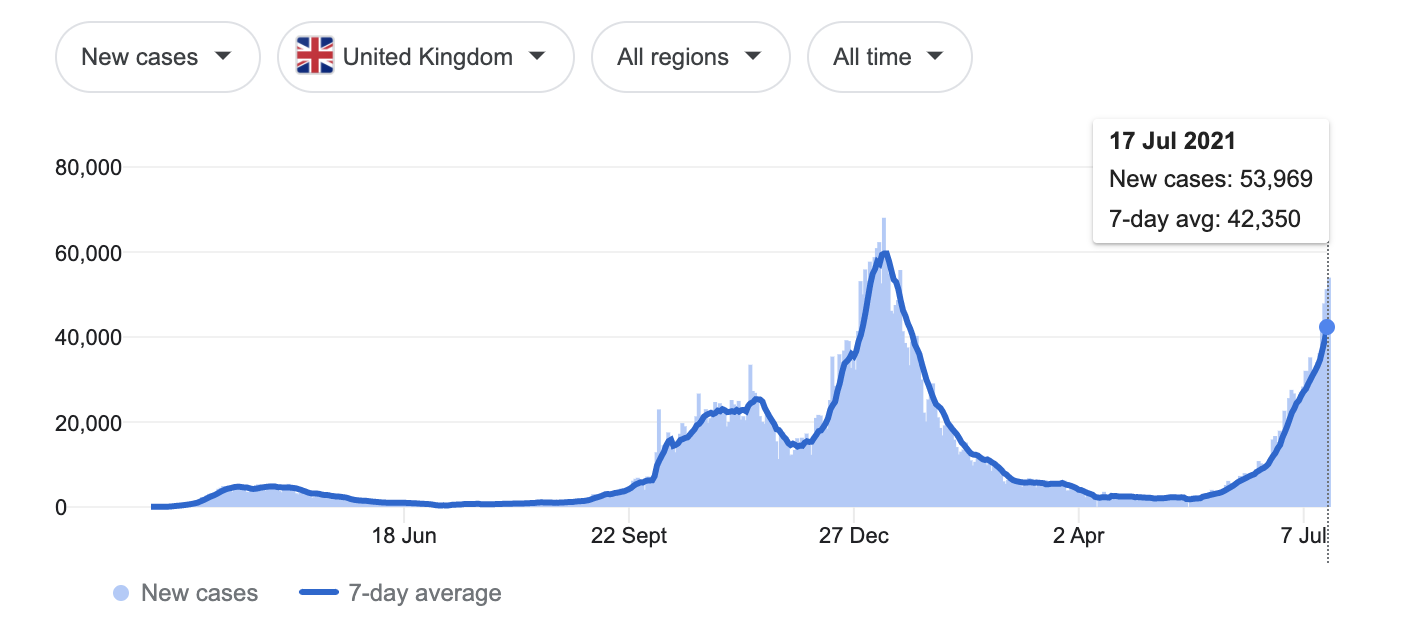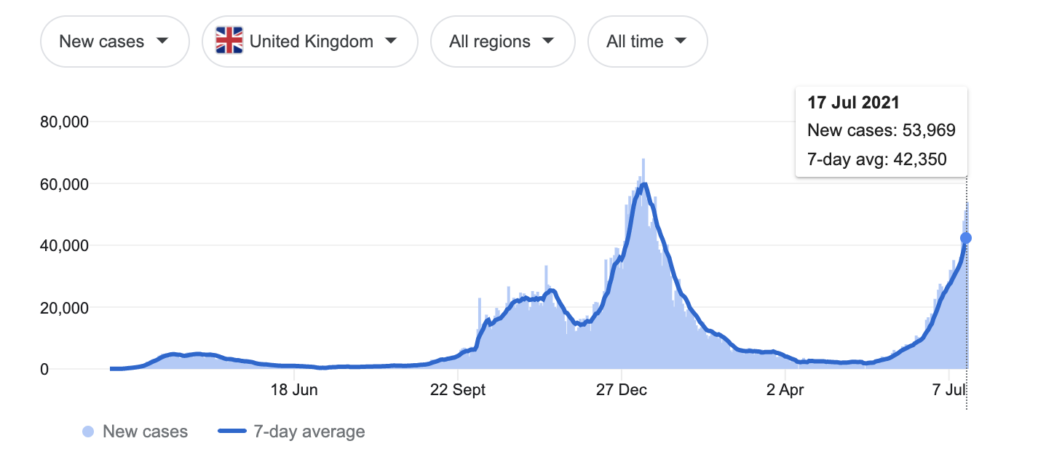England is about to take a huge gamble.
On Monday, July 19, the country is ditching all of its remaining pandemic-related restrictions. People will be able to go to nightclubs, or gather in groups as large as they like. They will not be legally compelled to wear masks at all, and can stop social distancing. The government, with an eye on media coverage, has dubbed it “Freedom Day,” and said the lifting of safety measures will be irreversible.
At the same time, coronavirus cases are rapidly rising in the UK. It recorded over 50,000 new cases on Friday, and its health minister says that the daily figure of new infections could climb to over 100,000 over the summer.
In theory, a full reopening during a surge in cases sounds like a combustible mix. But the UK government is betting that this time won’t be like the others because of its vaccination program.
Researchers say it’s extremely difficult to predict what will happen next, with multiple overlapping, complex factors at play. So let’s examine what we know, what we don’t know, and what we need to keep an eye on over the coming weeks.
What we know: the vaccines are working
The UK’s vaccination program is still under way, but it has been broadly successful so far. In all, 52% of the adult population is fully vaccinated, and about 87% of adults have received their first dose (this includes the 52% who have had both doses). Just 6% of Brits are hesitant about getting a shot, according to the Office for National Statistics.
There is still plenty of cause to be nervous, however. The country is months away from fully inoculating the entire adult population. Young people are particularly vulnerable; the over-18s have only just started to receive their first doses, and only a quarter of 18- to 39-year-olds have had both shots. And unlike the US and much of Europe, the UK has not started vaccinating children.
“That’s dangerous,” says evolutionary virologist Emilia Skirmuntt. “We need to vaccinate teenagers urgently, especially before they return to school in September.”
This matters because the overwhelmingly dominant strain of covid-19 in the UK right now is the delta variant. While fully vaccinated people have relatively little reason to worry about delta—with both Pfizer and AstraZeneca vaccines offering over 90% efficacy against hospitalization, according to data from Public Health England—the variant is bad news for those who have only had one shot or are unvaccinated.
It’s about 60% more transmissible than the alpha variant, which was previously dominant in the UK, and almost twice as likely to lead to hospitalization, according to Scotland’s public health body. A single dose of either the AstraZeneca or the Pfizer vaccine is just 33% effective against the delta variant, versus 50% for alpha, says data from Public Health England.
“This reopening is going to lead to a lot of avoidable damage,” says Deepti Gurdasani, a clinical epidemiologist at Queen Mary University of London. “We should be halting easing up until all adults and adolescents have been offered both doses of the vaccine.”
What we don’t know: when cases will peak
It’s clear that the UK is experiencing yet another wave of the pandemic. What we don’t know is just how bad it’s going to get—or how lifting restrictions will change that. Even the top experts in the field can’t say for sure.
“It is very hard to know what is going to happen after July 19,” says Graham Medley, professor of infectious disease modeling at the London School of Hygiene & Tropical Medicine and chair of SPI-M, a group of scientists that advises the UK government on pandemic modeling.

A lot depends on public behavior, and that is notoriously very tricky to predict. While some will enjoy their newfound freedoms with gusto (a tendency that was on full display last weekend during the final of the European soccer championships), others will be far more cautious.
Many people are frustrated at the ditching of masks, one of the most basic and effective public health measures. An Ipsos Mori poll found that a sizable majority of British people plan to continue to wear masks in stores and on public transport. If people follow through on this, it may help curb the spread somewhat: Israel, which also has high vaccination rates, had to reimpose mask-wearing indoors last month in the face of a steep rise in cases.
Regardless, it is very likely that cases will continue to rise for at least a few days, if not a few weeks. And that means more hospitalizations and deaths are inevitable, according to Medley. The big question is how high this wave gets.
In a webinar on Thursday, Chris Whitty, the chief medical officer for England, said the country could see “quite scary numbers again” and “get into trouble again surprisingly fast.”
But the government seems to be betting that not all numbers are equally scary. It hopes that hospitalizations will stay low enough to stop the National Health Service from being completely overwhelmed. It is making the assumption that the link between cases and hospitalization rates has been weakened, if not broken.
“This wave is very different to previous ones,” says Oliver Geffen Obregon, an epidemiologist based in the UK, who has worked with the World Health Organization. “The proportion of hospitalization is way lower compared to similar points on the epidemic curve before the vaccination program.”
But not everyone agrees. NHS bosses are already sounding the alarm over capacity, and more than 1,200 scientists have signed a letter in The Lancet arguing that Britain should care about the huge rise in infections, regardless of the rates of deaths and hospitalizations.
Gurdasani, the epidemiologist, is one of them.
“Cases matter,” she says, pointing to two main dangers: the increased chance that large numbers of people will develop long covid, and the risk of new, vaccine-dodging variants.
What we know: more people will get long covid
The UK already has a significant problem with long covid. More than two million adults may already have—or have had—complications that persist for 12 weeks or more, according to a major study from Imperial College London. But long covid is poorly understood, with over 200 symptoms ranging from fatigue to shortness of breath to memory issues, according to the largest study of it yet, recently published in The Lancet.
About one in 10 of those who catch covid-19 go on to develop long covid, according to the WHO. That means if another million people in the UK get sick during this wave—a plausible scenario by most estimates—there could be another 100,000 people with long-term issues.
Whitty is worried. “I think we will get a significant amount more long covid, particularly in the younger ages where the vaccination rates are currently much lower,” he said on July 6.
That could place huge pressure on the NHS, businesses, and society in general, not to mention causing untold misery for vast numbers of individuals.
“Some symptoms may persist for years, and there’s a chance we’re exposing a whole generation to very bad health for the rest of their lives,” says Skirmuntt.
What we don’t know: whether this could all spawn another dangerous variant
The big fear for many experts is that the government’s approach is creating an ideal breeding ground for the emergence of a vaccine-resistant variant.
On July 5, Steve Paterson, co-director of the Centre for Genomic Research at the University of Liverpool, summed up the concerns in a tweet: “Letting a virus rip through a partially vaccinated population is exactly the experiment I’d do to evolve a virus able to evade immunity.”







Recent Comments